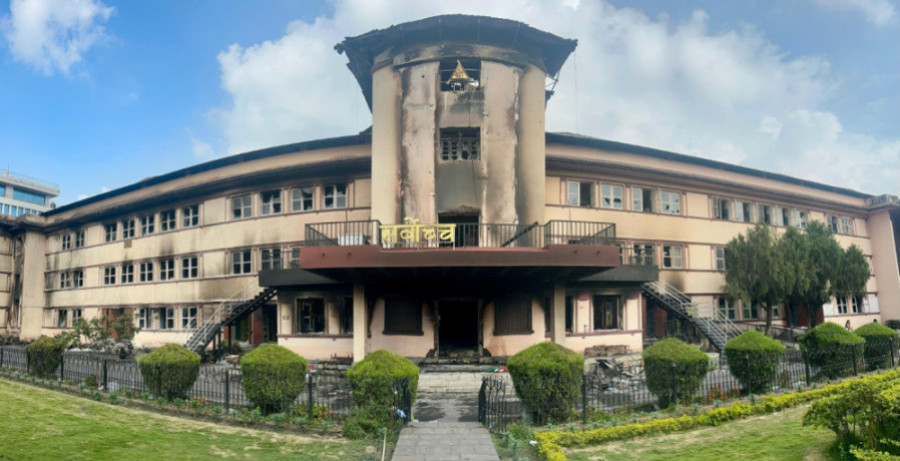Politics
10 petitions challenge Sushila Karki’s premiership and House dissolution
Petitioners want lower house reinstated. Experts say election is the only solution.
Binod Ghimire
As the Supreme Court resumed its limited service on Tuesday after a hiatus of over a month, 10 petitions were submitted against the formation of the interim government and the dissolution of the House of Representatives.
The lawyers, including young law students, have moved the top court, claiming that the formation of the new interim government under the former chief justice Sushila Karki is against the constitution. Citing its previous verdicts, they have also argued that dissolution of the lower house is unconstitutional.
“The court received 14 writ petitions today [Tuesday]. Ten of them related to House dissolution and government formation are being studied while the remaining four, related to other issues, have been registered,” said Nirajan Pandey, information officer at the court. “The court administration will decide on the unregistered petitions tomorrow [Wednesday].”
There are high chances of the petitions being registered and heard jointly, according to a Supreme Court official.
The Gen Z-led anti-corruption movement on September 8 and 9 ousted the KP Sharma Oli government. President Ramchandra Paudel, on the recommendation of the movement representatives, appointed Karki as prime minister of the interim government on September 12. He also dissolved the House of Representatives, a key demand of the agitators, on Karki’s recommendation, giving her six months to conduct parliamentary elections.
The petitioners have cited three Articles of the Constitution of Nepal to challenge Karki’s appointment and have presented the court’s precedents in seeking the reinstatement of the lower house. They claim the appointment of Karki as prime minister is a direct breach of Articles 132 and 76.
Chief justice and justice of the Supreme Court cannot be engaged in any other office than the National Human Rights Commission as per Article 132. It further says that no person who has once held the office of chief justice or justice of the Supreme Court shall be eligible for appointment to any government office.
Likewise, Article 76 sets three conditions to be a prime minister, with a clear provision that one needs to be a member of the lower house. They also have claimed that Paudel acted against Article 61 of the constitution which says the main duty of the President is to abide by and protect the constitution.
“Reinstate Parliament and revoke Karki’s appointment by deeming the decision ultra vires,” reads one of the petitions.
As per the petitions, the dissolution not just contradicts the constitution but also stands against the top court’s precedents. The court had reinstated the House of Representatives twice after it was dissolved by the then Oli-led government in 2020 and 2021. It had ruled that the constitution envisions a full five-year term for the lower house.
The Supreme Court, which turned to ashes in the September 9 arson, started taking petitions starting Tuesday. However, it had been hearing habeas corpus petitions since September 24.
Constitutional experts, who have followed the developments, say while everyone has the right to file petitions, the court should pass verdicts carefully and by embracing the spirit of the recent political change.
They say the formation of the Karki government and the dissolution of the parliament were political solutions to political problems. “There is no alternative to elections. No decision that hinders timely election benefits the country,” said Raju Prasad Chapagain, senior advocate. “The elections can remove constitutional problems.”
He said the elections, scheduled for March 5 next year, offer all political parties and forces a chance to be tested by the sovereign people and come to parliament with a fresh mandate.
Everyone should get ready for the elections, he said. “Restoration of the dissolved parliament wouldn't solve the country’s problems. That said, the government must also create a conducive environment for elections.”
After a political movement, decisions cannot be made strictly by adhering to the letter of the constitution, according to experts. “In the changed context, decisions should be made accordingly by the court. This is the change brought about by a political movement,” said Dinesh Tripathi, a senior advocate.
In a statement issued two days after the dissolution of the lower house, eight political parties that were represented in it termed the dissolution unconstitutional and a breach of parliamentary tradition.
In a joint statement, the Nepali Congress, the CPN-UML, the CPN (Maoist Centre), the CPN (Unified Socialist), the Janata Samajbadi Party, the Loktantrik Samajbadi Party, the Nagarik Unmukti Party, and the Janamat Party demanded that the decision be reversed immediately. They said the move undermined the supremacy of the constitution as well as the people’s mandate.
While the Congress has kept both the options of the election and reinstatement of parliament open, the UML has been vocal about the need for immediate reinstatement.




 20.53°C Kathmandu
20.53°C Kathmandu














